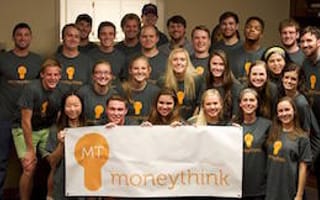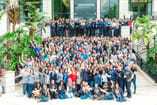
As the chasm between the upper one percent of earners and the rest of us continues to widen, many people (regardless of socioeconomic status) are left scratching their heads with increasing fervor. For millennials, mounting student debt, postponed home and car ownership, and fingers pointed in every direction call into question the economic future of the generation — and country at large.
But one small Chicago tech startup wants to tackle the problem in all its enormity.
, which is based out of the University of Chicago’s Chicago Innovation Exchange, is working to spur financial capabilities in young people in order to rebuild the economic health of the country.“Moneythink is an organization that helps young adults develop bulletproof financial habits,” said Ted Gonder, Moneythink’s co-founder and CEO. “Our vision is to make financial capability a norm in the United States by 2030.”
The organization focuses on teaching mindful spending, regular savings, and the safe use of financial products.
Born out of the financial crisis of 2008, Moneythink originally launched as a network of volunteers who taught personal finance workshops to local high schools. But as outrage around the economic crisis exploded, so too did demand for the workshops, and Moneythink’s presence spread across the country.
With the success of the organization spreading, Gonder and his team soon began to realize that in-classroom instruction alone wasn’t the best approach to promoting new behaviors.
“You might know something because a volunteer came in and taught it to you, but that doesn’t necessarily mean you’re going to apply it when the time comes," he said. "We realized that all of our students’ financial decisions were happening outside of the classroom, while all of our teaching was happening inside the classroom.”
In order to help marry theory with practice, Moneythink developed MoneythinkMobile (Gonder said the students dub it “Instagram for money”), a digital tool used to translate a week’s given lesson into real-life applications. The app is gamified and allows users to share photos of themselves making whatever smart financial decisions they’ve been learning about.
“We realized that we needed to be doing more than just teaching knowledge. We needed to be helping students actually translate that knowledge into habits and behaviors outside of the classroom,” Gonder said.
And the app isn’t just an incentivizing tool for students. It also arms organizations with a way to engage with students outside of class and collects a robust data set to measure success rates, which can in turn be reported back to donors or foundations in order to secure another year of funding.
All of those efforts, he said, are centered on fostering smart financial habits in young adults — a generation in high need of support.
Gonder said the fastest-growing group of bankruptcy filers are in the 18 to 24 age group. Add to that equation skyrocketing student loan obligations and a workforce that, by necessity, has to eschew stable pensions in favor of more flexible, transient work, and you’ve got a new economic reality that breeds inequality.
And that doesn’t even take things that stack odds against certain demographics — like the zip code they were born in or what their parent’s education or income level is — into account.
Today, Moneythink works to help students build that strong foundation to responsible personal finance, from how to spend their first-ever paycheck to how to get a handle on student loans to avoid dropping out of college.
“If we can prevent a lot of these mistakes in the first place, then on the whole we can create a society that’s better off,” he said.
Moneythink launched in 2008 and is run by a staff of 10, with over 500 volunteers across the country. Together, they serve more than 1,500 students across the country aged anywhere from 16 to 24.
Images via Moneythink/Facebook.
Do you have a tip for us? Shoot us an email or follow us on Twitter@BuiltInChicago.







